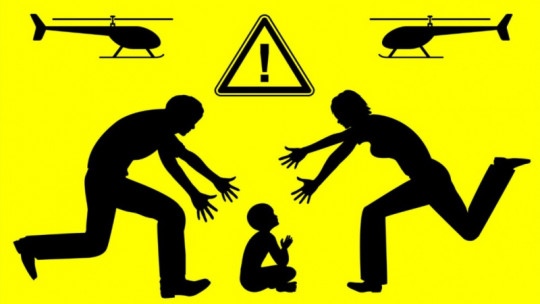
“Who, being loved, is poor?” asks Oscar Wilde in the play A woman of no importance. We can agree that knowing we are loved by others is a feeling capable of beautifying many corners of our lives, whether it is the love of siblings, parents, partners or other close people. That wealth that love brings to our lives, contrary to what the messages and movies we have grown up with suggest, does not come from an eternal, wonderful and inexhaustible source of love.
In truth, it is hard to recognize that love can end. Even in those relationships in which one of the parties claims to experience unconditional love, which goes beyond the behavior of the other – as happens with many parents with respect to their children when they maintain that they will love them “whatever they do” -, It is a relationship like any other; and therefore, it must be cared for by both parties to be truly meaningful.
People want to preserve all those relationships that we consider worthwhile for our lives, to take care of the people who add up, but it is very difficult for that to happen without disagreements or conflicting interests arising between us at some point. When this happens, in the distance, it is possible to see that a difficult conversation is approaching. However, avoiding the situation is not always the best strategy to resolve it.
Sometimes it can help, but on other occasions, to deal in a healthy way with those points of friction that occur in every relationship, we must learn to negotiate or maintain our position as appropriate. Therefore, to determine the best way to act in a complex situation, it will be very useful to have a wealth of social skills to draw on. In this article, we will look at some interpersonal skills that can help you navigate difficult conversations
Social skills: what for?
Social skills are those skills that allow us to negotiate with others; They give us the ability to establish reciprocal ties; to listen to the other person’s opinion and empathize with it; But at the same time, they give us the ability to explicitly say what we need and to know when we should stand our ground. If we do not have sufficient interpersonal skills, or if we have not said what we needed to say at a specific moment, we could run the risk of tolerating situations with which we disagree or with which we do not feel completely comfortable. Consequently, on several occasions we end up postponing having a difficult conversation with someone we love, either for fear of hurting them or that our opinion will not be heard.
This also usually happens in situations in which what is at stake is not love for the other person – as could happen with a college friend or our boss – but it is still a relationship that we must care, since it mediates an important area for the life we want to live. Perhaps we will have to come to an agreement with our boss during work hours, even if we don’t get along with her at all, if we want to preserve that work that represents a way for us to fulfill ourselves creatively—assuming that this is valuable to us. Even in the coldest or most turbulent relationships, there may be something worth asking for, negotiating, or giving up ; even if that is separation or distance.
Interpersonal skills as a toolbox
A psychological theoretical construct that has received the attention of multiple scientific investigations in recent decades and that, at the same time, can be useful when facing these types of conversations, is interpersonal skills. According to Boggiano and Gagliesi, interpersonal skills are those that are at the service of people being able to build new relationships while ending others that are destructive for us.
At the same time, they allow us “walking the middle path of relationships”, between creating and maintaining balance, between giving in and standing firm, between acceptance and change. They are also useful to be able to express what we need from others, to get others to take our opinions seriously and to be able to say no clearly. These objectives can only be achieved if we are assertive, which means explicitly expressing, without being aggressive or inhibited, what we need from the other.
Dialectical behavioral therapy (DBT) seeks to help clients acquire interpersonal skills to achieve therapeutic objectives. Next, we will present a set of skills that can be remembered by the acrostic DEAR MAN and that are used in this type of therapy, although stating them is in no way intended to replace a formal psychotherapy process led by a mental health professional. The interpersonal skills described are useful to increase the chances of getting what we want in a difficult conversation even in the presence of intense emotional states or interlocutors who might disagree with us. At the same time, they are useful to evaluate how we want our relationship with the other person to be after that complicated encounter.
One last point to clarify before developing these skills is that the proposal to communicate with others following these guidelines may seem, a priori, a naive idea or one that goes against one’s own authenticity (“Reciting a script to resolve a conflict?” with my boss? I don’t think it will work. However, we must deny the idea that being authentic implies behaving as one spontaneously does. We are more than the way we behave ; and we are also more than those narratives—sometimes, opinions—that we tell ourselves about what kind of person we are based on the way we react, emote, and ask. Continuing along the same path sometimes means resenting a change that could bring into our lives a healthier way of connecting with others and expressing what we want and need.
What is DEAR MAN?
DEAR MAN is an acrostic whose function is remind us of each of the skills necessary to be more efficient when placing an order or saying no, vitally important to resolve a delicate conversation. It is made up of two words that each represent a set of separate but complementary skills.
DEAR, to ask effectively
First, DEAR seeks to maximize the chances of effectively getting what we want, while minimizing the probability that the other person will become defensive when we set a limit or say no. Therefore, DEAR could be broken down into the following skills:
D: Describe the problem using only the facts and not our judgments
For example, instead of saying that “the kitchen was a mess because you didn’t wash the dishes,” we could say: “Yesterday I came home and saw that in the kitchen there were three plates with the remains of dinner, could we talk to the regard?”
E: Express orders from our need
This means clearly stating how we feel in the situation we describe. Therefore, it is more effective to communicate using the formula “when… (a certain situation occurs), I feel… (in this or that way)”, than to say “you/you make me feel…”.
A: (Be) Assertive
It involves going beyond expressing how we feel. We must say what specific actions we want the other to carry out after our request. It is useful to be as concrete and specific as possible rather than referring to vague or general abstractions, such as asking the other person to be “more expressive” or “cleaner.”
A: Strengthens
It means telling the other person what benefits they could obtain if they listen to our request: what would he or she gain from it?
MAN, to know what to do after ordering
MAN, for its part, has the purpose of reminding us how to behave after placing an order. MAN is extremely useful because, on many occasions, no matter how much we communicate assertively—even when it seems to be taken “from the manual”—, The other person may be defensive, respond aggressively, or disagree with our request Some people may raise their voices, shout, or refer to mistakes we have made in the past that have little to do with the current problem. Interpersonal effectiveness skills are also useful for knowing what to do in these situations. MAN is made up of:
M: Maintain our position
It is key for interpersonal relationships because, when faced with a negative or aggressive response from the other, we tend to inhibit ourselves or underestimate the importance of our request. This skill reminds us that it is important to return to our need and our request again and again if the other person reproaches us for some past event. We should not stick to these complaints, but recognize that it is valid to want to talk about that problem later, but now we need to deal with it.
A: Pretend
It involves ensuring that our tone of voice, posture and facial expression match what we are asking for. Setting limits may make us feel anxious, but even in the presence of anxiety we can look the other person in the eyes, loosen our expression and let our shoulders drop, a posture ready for dialogue.
N: Negotiate
It means, even if we maintain our position, being open and flexible for the other to propose new alternatives to our request. We can even ask him to propose solutions to the conflict himself.
Social skills can be developed in psychotherapy
Knowing the DEAR MAN acrostic is like having a sticky note in front of our workspace: every time we’re about to have a difficult conversation, allows us to remember at a glance what strategies we can use to express our needs effectively ; to direct us towards our objectives and towards those values that determine what is meaningful to us.
We don’t have to have effective interpersonal skills by default. In fact, it is even expected that we do not have them. It is very likely that we have not been taught them directly as children, nor have we learned them through observation from our parents or caregivers (because they most likely did not put them into practice either!). And that’s not bad.
We are all doing the best we can in this life with the resources we have available to us. But we must know that this does not mean we should give up the possibility of finding a better way of behaving and building valuable relationships with others. These axes They are usually addressed in depth in psychotherapy when working on the development of social skills








